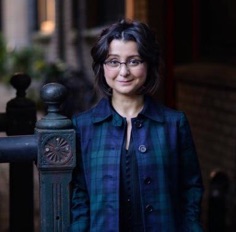Ulya R. Karpuzcu
Associate Professor
Department of Electrical and Computer Engineering
University of Minnesota, Twin Cities
4-155 Keller Hall
200 Union St. S.E.
Minneapolis, MN, 55455
ukarpuzc @ umn.edu

Brief Biography CV
Ulya R. Karpuzcu is an associate professor at the Department of Electrical and Computer Engineering of University of Minnesota. She received the Ph.D. and M.S. degrees in Computer Engineering from University of Illinois, Urbana-Champaign. Her research interests span physics of computing, energy-efficient computing, application-domain specialized architectures, hardware security and reliability, approximate computing.
News
-
•July MMXVIII: Karpuzcu is on sabbatical leave at Brown University.
-
•July MMXVII: Karpuzcu, Sapatnekar, Wang received an NSF SPX grant on scalable in-memory processing using spintronics.
-
•January MMXVI: Karpuzcu received the NSF CAREER Award on “Trading Communication and Storage for Computation to Enhance Energy Efficiency”.
-
•June MMXV: We released ACCURAX, a compilation of safe accuracy metrics for approximate computing, along with an output randomization tool.
-
•September MMXIV: Karpuzcu received an NSF CCF grant on soft (approximate) near-threshold voltage computing.
-
•August MMXIV: Lilja, Sartori, and Karpuzcu received an NSF XPS grant on approximate communication to enhance energy efficiency.
-
•January MMXIV: The second Workshop on Near-threshold Voltage Computing will be held w/ ISCA. Call for Papers
-
•Spring MMXIV: New Course Announcement: EE8950 Physics of Computation Syllabus
-
Inspired by Richard Feynman’s lectures, “Physics of Computation” explores how physical principles/limits shape paradigms of computing.
-
Goal: To understand how (and to what extent) a paradigm shift in computing can help with emerging energy problems.
-
Scope: Physical limits of computing, coding and information theoretical foundations, computing with beyond-CMOS devices, reversible computing,
-
quantum computing, stochastic computing. For each computing paradigm, we cover (i) how information is represented, processed, stored, and communicated;
-
(ii) to what extent shortcomings can be addressed; (iii) how the application domain looks like.
-
•September MMXII: We are organizing the first Workshop on Near-threshold Voltage Computing w/ MICRO. Call for Papers
Select Publications Google Scholar Full List
-
•POWERT Channels: A Novel Class of Covert Communication Exploiting Power Management Vulnerabilities, HPCA 2019.
-
•Toward Dynamic Precision Scaling, IEEE Micro Magazine Special Issue on Approximate Computing, 2018.
-
•Efficient In-Memory Processing Using Spintronics, CAL 2017.
Open-Source
We released:
-
•QuantumOps, an R package for quantum computing.
-
•VARIUS(TC,NTV), a (micro)architectural model of parametric variation.
-
•ACCURAX, a compilation of safe accuracy metrics for approximate computing, along with an output randomization tool.
Teaching
-
•ENGN2912M Introduction to Quantum Computing and Physical Basics of Computing (Brown): Fall MMXVIII Syllabus
-
•EE5340 Physics of Computation: Spring MMXVII Spring MMXV Spring MMXIV
-
•EE4363/CSci4203 Computer Architecture & Machine Organization: Spring MMXVIII Fall MMXVI Spring MMXVI Fall MMXIV Fall MMXIII
-
•EE5364/CSci5204 Advanced Computer Architecture: Fall MMVII Fall MMV Fall MMXII
Information for Prospective Students
-
•Our lab’s doors are wide open to motivated Ph.D. students and undergraduate researchers.
-
•For M.S. students, the thesis option is a necessary but not sufficient condition.
Service
-
•Technical Program Committee Member:
ISCA 2019, HPCA (2018, 2016, 2014), MICRO (2018, 2015), ICCAD (2015-2017)
-
•Co-organizer: Workshop on Near-threshold Voltage Computing with ISCA 2014, with MICRO 2012
-
•Organization Committee Member: ASPLOS (2019, 2018, 2015), ISCA 2014
About
Ulya R. Karpuzcu comes from İstanbul. She attended Österreichisches St. Georgs Kolleg (Austrian School İstanbul), and İstanbul Teknik Üniversitesi
(B.S. in Electronics and Telecommunication Engineering & B.S. in Computer Engineering).
Academic Genealogy (courtesy of José Martínez, Ph.D. 2002, Illinois)
Nathaniel Bowditch, M.A. 1802 (Honorary), Harvard
Benjamin Peirce, A.B. 1829, Harvard
Joseph Lovering, A.B. 1833, Harvard
John Trowbridge, S.D. 1873, Harvard
Wallace Sabine, A. M. 1888, Harvard
Percy Bridgman, Ph.D. 1908, Harvard
John Slater, Ph.D. 1923, Harvard
Samuel Silver, Ph.D. 1940, MIT
Gedaliah Held, Ph.D. 1954, Berkeley
Akira Ishimaru, Ph.D. 1958, Washington
Dick Kieburtz, Ph.D. 1961, Washington
John Hennessy, Ph.D. 1977, SUNY Stony Brook
Josep Torrellas, Ph.D. 1992, Stanford
Ulya R. Karpuzcu, Ph.D. 2012, Illinois
The views and opinions expressed in this page are strictly those of the page author.
The contents of this page have not been reviewed or approved by the University of Minnesota.
Last updated January, MMXIX by Ulya Karpuzcu.